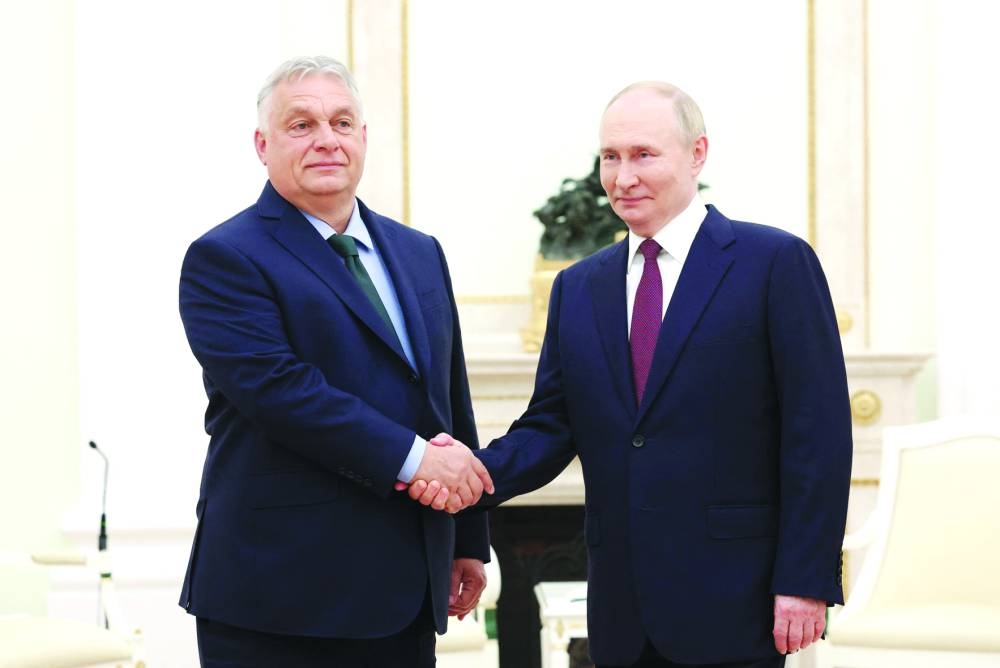Russian President Vladimir Putin told Viktor Orban yesterday that Ukraine must effectively capitulate if it wants peace, in a visit to Moscow by the Hungarian leader that angered the EU, US and Kyiv.
Putin was hosting Orban – the friendliest leader in the EU to Moscow – for talks at the Kremlin, described by the Russian president as a “really useful, frank conversation” on the conflict in Ukraine.
A string of EU officials blasted the Hungarian prime minister’s surprise trip, saying that it threatened to undermine the 27-member bloc’s stance on the conflict and stressed that he was not representing Brussels.
The pair “talked about the possible ways of resolving” the Ukraine conflict, Putin said in remarks after a bilateral meeting.
The Kremlin leader repeated his demand that Ukraine withdraw all its troops from regions that Moscow has annexed and said Kyiv was “not ready to drop the idea of waging war until a victorious end”.
Putin said at the start of the talks that he wanted to “discuss the nuances that have developed” over the conflict in Ukraine with Orban, who visited Kyiv earlier this week.
Orban in turn said he had realised “positions are far apart” between the two sides.
“The number of steps needed to end the war and bring about peace is many,” he said.
The visit came days after Hungary took over the EU’s rotating presidency and Putin told Orban he expected him to outline “the position of European partners” on Ukraine.
The Ukrainian government lambasted the meeting, stressing that they had no hand in its planning.
“The decision to make this trip was made by the Hungarian side without any agreement or coordination with Ukraine,” Kyiv’s foreign ministry said in a statement.
European Union leaders lashed out at Orban over the trip.
“Appeasement will not stop Putin,” European Commission head Ursula von der Leyen wrote on X. “Only unity and determination will pave the path to a comprehensive, just and lasting peace in Ukraine.”
EU foreign policy chief Josep Borrell said in a statement that Orban’s “visit to Moscow takes place, exclusively, in the framework of the bilateral relations between Hungary and Russia”.
“Orban has not received any mandate from the EU Council to visit Moscow,” he added.
The EU has firmly opposed Russia’s military offensive in Ukraine, imposing 14 rounds of unprecedented sanctions on Moscow.
“That position excludes official contacts between the EU and President Putin. The Hungarian Prime Minister is thus not representing the EU in any form,” Borrell said. “It is worth recalling that President Putin has been indicted by the International Criminal Court and an arrest warrant released for his role in relation to the forced deportation of children from Ukraine to Russia.”
EU Council chief Charles Michel had earlier reiterated the common stance that “no discussions about Ukraine can take place without Ukraine”.
The White House also criticised the trip as “counterproductive” and the North Atlantic Treaty Organisation (Nato) military alliance, of which Hungary is a member, distanced itself.
Orban’s visit “will not advance the cause of peace and is counterproductive to promoting Ukraine’s sovereignty, territorial integrity and independence”, White House press secretary Karine Jean-Pierre said.
Nato head Jens Stoltenberg said Orban had informed the alliance of his trip but stressed the Hungarian leader was “not representing Nato at these meetings. He’s representing his own country”.
Kremlin spokesman Dmitry Peskov told Russian state TV the visit had been Orban’s idea and Russian officials only heard about the trip on Wednesday – a day after Orban had visited Kyiv.
Hungary’s six-month EU presidency gives the central European country sway over the bloc’s agenda and priorities for the next six months.
Orban’s visit to Moscow comes days after the right-wing nationalist made a surprise trip to Kyiv, where he urged Ukraine’s leadership to work towards a rapid ceasefire with Russia.
Yesterday the Hungarian leader insisted that peace cannot be achieved without dialogue.
Orban said he recognised he had no EU mandate for the trip, but that peace could not be made “from a comfortable armchair in Brussels”.
“We cannot sit back and wait for the war to miraculously end,” he wrote on X.
Polish Prime Minister Donald Tusk expressed disbelief at Orban’s Moscow trip, while Finnish Prime Minister Petteri Orpo called it “disturbing news”.
An EU diplomat, speaking on condition of anonymity, said Orban’s trip meant that scepticism within the bloc about Hungary’s presidency was “unfortunately justified – it’s all about promoting Budapest’s interests”.
Lithuanian President Gitanas Nauseda accused Orban of undermining the EU presidency. “If you truly seek peace, you don’t shake hands with a bloody dictator, you put all your efforts to support Ukraine,” he wrote on X.
Estonian Prime Minister Kaja Kallas, who is set to become the next EU foreign policy chief, said Orban was exploiting the EU presidency position to sow confusion.
“The EU is united, clearly behind Ukraine and against Russian aggression,” she said.
Hungarian Foreign Minister Peter Szijjarto hit back.
“Hungary is an independent country so I don’t think we should pay attention to such kind of criticism. Time has proven...that without dialogue, without keeping the channels of communication open, there is no solution to this war,” he said.

This pool photograph distributed by the Russian state agency Sputnik shows Putin with Orban at the Kremlin. – AFP
